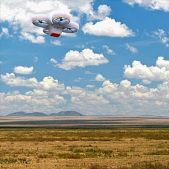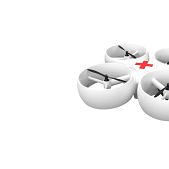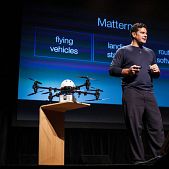
He is planning drones with humanitarian nature
The Greek businessman Andreas Raptopoulos is planning drones – unmanned aerial vehicles (UAV) – that take on a humanitarian nature with the potential to deliver medical supplies to roadless areas.
“When you think of all the robotics companies in the world, I don’t know any whose first customer was not military. This is how robotics companies are built. We thought: screw that, we are going to replace the military with the humanitarian,” the Greek entrepreneur stated.
The idea for the drones framed by a provider of medical supplies network came up a night before a presentation at Silicon Valley’s Singularity University. This idea evolved into a startup company called Matternet, aiming at providing help to people in developing parts of the world that have no access roads.
According to Andreas Raptopoulos, such a system could leapfrog the building of infrastructure, just as mobile networks had overtaken fixed lines in developing countries.
Small eight-propeller UAVs will be used to carry small items weighing up to 2kg, years before the construction of modern road networks which would interconnect areas.
The system in total would include the UAVs themselves, landing stations where the packages can be dropped off and transferred as well as the software which will ensure the UAV’s arrival to its destination. Due to their short battery life, the drones would have to cooperate with each other. Instead of one drone flying for 60 minutes, there will be six drones flying for 10 minutes each.
The Matternet company has performed tests in Haiti and Dominican Republic as well as in Lesotho which suffers from an AIDS epidemic. Lesotho has been identified as a place where the system could transfer laboratory samples to the countryside.
According to Mr. Raptopoulos, aid agencies are being targeted as first users as well as pharmaceutical and logistics organizations. The company has ruled out the possibility of sales to the military. Ideally, drones and base stations would be bought by villages.
“Anybody can basically set up the transportation networks. It is decentralized. You don’t need governments, you don’t need big companies,” Raptopoulos noted.
In regards to the cost, it is estimated at about 7,200 euros per aircraft and 3,600 euros per base station.
Source: Greekreporter

















